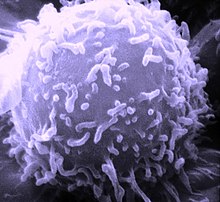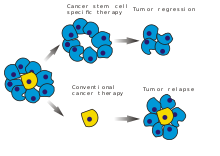Cancer cell: Difference between revisions
ClueBot NG (talk | contribs) m Reverting possible vandalism by 70.91.216.217 to version by Pinethicket. False positive? Report it. Thanks, ClueBot NG. (713337) (Bot) |
|||
| Line 11: | Line 11: | ||
cells.<ref>[http://www.sciencedaily.com/releases/2010/10/101027151209.htm Too much SP2 protein turns stem cells into 'evil twin' cancer cells]. Sciencedaily.com (2010-10-27). Retrieved on 2010-12-01.</ref> Other issues thought to play a role in the spread of [[cancer]] include [[virus]]es, immune system issues, genetics, environment and age.<ref>[http://www.cancerhelp.org.uk/about-cancer/causes-symptoms/causes/what-causes-cancer What causes cancer? : Cancer Research UK : CancerHelp UK]. Cancerhelp.org.uk (2010-07-15). Retrieved on 2010-12-01.</ref> However, a lack of particular co-stimulated molecules that aid in the way antigens react with lymphocytes can impair the natural killer cells ability and ultimately cause cancer.<ref name="autogenerated1"/> |
cells.<ref>[http://www.sciencedaily.com/releases/2010/10/101027151209.htm Too much SP2 protein turns stem cells into 'evil twin' cancer cells]. Sciencedaily.com (2010-10-27). Retrieved on 2010-12-01.</ref> Other issues thought to play a role in the spread of [[cancer]] include [[virus]]es, immune system issues, genetics, environment and age.<ref>[http://www.cancerhelp.org.uk/about-cancer/causes-symptoms/causes/what-causes-cancer What causes cancer? : Cancer Research UK : CancerHelp UK]. Cancerhelp.org.uk (2010-07-15). Retrieved on 2010-12-01.</ref> However, a lack of particular co-stimulated molecules that aid in the way antigens react with lymphocytes can impair the natural killer cells ability and ultimately cause cancer.<ref name="autogenerated1"/> |
||
All cancers begin in cells, the body's basic unit of life. To understand cancer, it's helpful to know what happens when normal cells become cancer cells. |
All cancers begin in cells, the body's basic unit of life. To understand cancer, it's helpful to know what happens when normal cells become cancer cells.bawls |
||
The body is made up of many types of cells. These cells grow and divide in a controlled way to produce more cells as they are needed to keep the body healthy. When cells become old or damaged, they die and are replaced with new cells. |
The body is made up of many types of cells. These cells grow and divide in a controlled way to produce more cells as they are needed to keep the body healthy. When cells become old or damaged, they die and are replaced with new cells. |
||
Revision as of 13:39, 9 November 2011
This article needs attention from an expert on the subject. Please add a reason or a talk parameter to this template to explain the issue with the article. (March 2011) |


Cancer cells are cells that grow and divide at an unregulated, quickened pace. Although cancer cells can be quite common in a person they are only malignant when the other cells (particularly natural killer cells) fail to recognize and/or destroy them.[1] In the past a common belief was that cancer cells failed to be recognized and destroyed because of a weakness in the immune system. However, more recent research has shown that the failure to recognize cancer cells is caused by the lack of particular co-stimulated molecules that aid in the way antigens react with lymphocytes.[2]
Causes
By researching stem cells scientists have suggested that too much SP2 protein may turn stem cells into cancer cells.[3] Other issues thought to play a role in the spread of cancer include viruses, immune system issues, genetics, environment and age.[4] However, a lack of particular co-stimulated molecules that aid in the way antigens react with lymphocytes can impair the natural killer cells ability and ultimately cause cancer.[2]
All cancers begin in cells, the body's basic unit of life. To understand cancer, it's helpful to know what happens when normal cells become cancer cells.bawls
The body is made up of many types of cells. These cells grow and divide in a controlled way to produce more cells as they are needed to keep the body healthy. When cells become old or damaged, they die and are replaced with new cells.
However, sometimes this orderly process goes wrong. The genetic material (DNA) of a cell can become damaged or changed, producing mutations that affect normal cell growth and division. When this happens, cells do not die when they should and new cells form when the body does not need them. The extra cells may form a mass of tissue called a tumor.
Pathology
White Blood cells are thought to use a dual receptor system when they determine whether or not to kill human cells. If a cell is under stress, turning into tumors, or infected molecules including MIC-A and MIC-B are produced to put on the surface of the cell.[1] These work to detect and kill cancer cells.[5]
Discovery
Some descriptions of cancer go back to ancient Egypt as far back as 1600 BC and the understanding of cancer was significantly advanced during the Renaissance period. However, Sir Rudolf Virchow, a German biologist and politician, is generally credited with discovering the first cancer cells. As Giovanni Morgagni had linked autopsy findings seen with the unaided eye with the clinical course of illness, so Virchow correlated the microscopic pathology.[6]
See also
References
- ^ a b The Innate Immune System: NK Cells. Student.ccbcmd.edu. Retrieved on 2010-12-01.
- ^ a b Creating Cancer Killers. Research.uky.edu. Retrieved on 2010-12-01.
- ^ Too much SP2 protein turns stem cells into 'evil twin' cancer cells. Sciencedaily.com (2010-10-27). Retrieved on 2010-12-01.
- ^ What causes cancer? : Cancer Research UK : CancerHelp UK. Cancerhelp.org.uk (2010-07-15). Retrieved on 2010-12-01.
- ^ The Adaptive Immune System: Ways That Antibodies Help to Defend the Body - Antibody-Dependent Cellular Cytotoxicity (ADCC). Student.ccbcmd.edu. Retrieved on 2010-12-01.
- ^ History of cancer
External links
- BCG strain S4-Jena: An early BCG strain is capable to reduce the proliferation of bladder cancer cells by induction of apoptosis. Ncbi.nlm.nih.gov. Retrieved on 2010-12-01.
- The History of Cancer. Cancer.org. Retrieved on 2010-12-01
